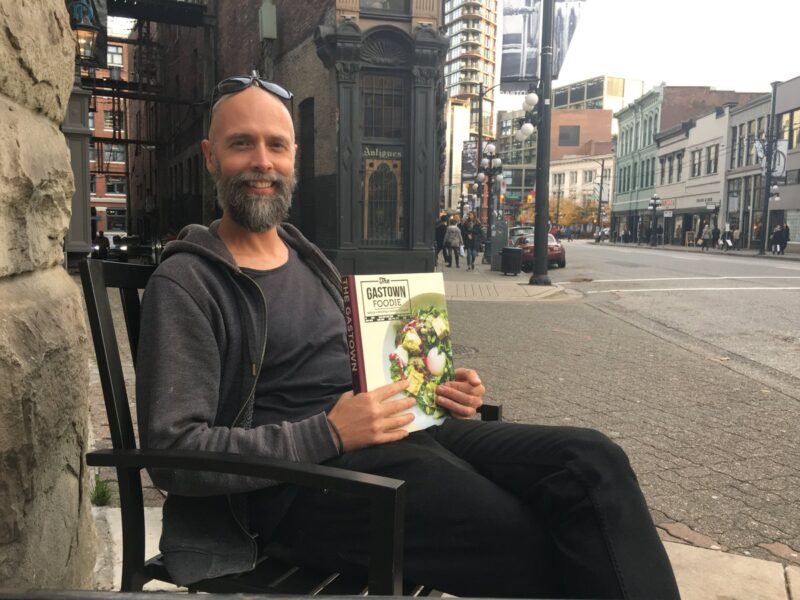1043 In the mood for purple
The Plant-based Foodie Vancouver
by Brad Hill and Chris Dagenais; foreword by Erin Ireland and Anna Pippus
Vancouver: Brad Hill Imaging Ltd., 2018. Available here, here, and here
$28.95 / 9780994919540
Reviewed by Jessica Poon
*
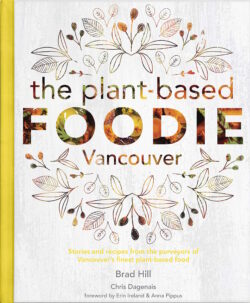 There are two kinds of recipes: aspirational and accessible; they are not mutually exclusive, although they can be. The aspirational recipe may require more forethought, calling for an unfamiliar ingredient not found in your usual grocery store (read: not Western); sometimes, it is almost apologetic for being so elaborate with the tacit promise that it will be worth it, that good things take time. Of course, that is also its most evident charm. These recipes are often the kind you expect in a restaurant so fancy you’re too self-conscious to use the word “fancy” in it (there’s something awfully crass about the word “fancy,” much like the word “classy”). The accessible recipe is the one that the home cook reaches for time and time again; that is, if they haven’t ascribed it to muscle memory with their own finessed modifications; maybe you decided it needs more salt than called for, or you decided cayenne pepper would be a nice touch; the recipe becomes more of an inspiration than a biblically mandated adherence, a beautiful exercise in synergy between the author and you, the reader/cook.
There are two kinds of recipes: aspirational and accessible; they are not mutually exclusive, although they can be. The aspirational recipe may require more forethought, calling for an unfamiliar ingredient not found in your usual grocery store (read: not Western); sometimes, it is almost apologetic for being so elaborate with the tacit promise that it will be worth it, that good things take time. Of course, that is also its most evident charm. These recipes are often the kind you expect in a restaurant so fancy you’re too self-conscious to use the word “fancy” in it (there’s something awfully crass about the word “fancy,” much like the word “classy”). The accessible recipe is the one that the home cook reaches for time and time again; that is, if they haven’t ascribed it to muscle memory with their own finessed modifications; maybe you decided it needs more salt than called for, or you decided cayenne pepper would be a nice touch; the recipe becomes more of an inspiration than a biblically mandated adherence, a beautiful exercise in synergy between the author and you, the reader/cook.
 The Plant-Based Foodie by Brad Hill (featuring write-ups from Chris Dagenais and a foreword by Erin Ireland and Anna Pippus) is an invigorating, welcome addition to the emergence of plant-based/vegan cookbook offerings, soliciting the recipes of Vancouver restaurants that are either wholly vegan or have a vegan dish worth replicating at home. Well-known vegan standbys like Virtuous Pie, The Naam, and MeeT are featured. If you ever wanted to know exactly how your favourite vegan restaurant dish was prepared, this cookbook is for you. There are no overzealous, guilt-inducing attempts at puritanical conversion; first and foremost is simply this question: is it delicious? Yes. Is it plant-based? Also, yes. Of course, there are political elements to plant-based eating (and, really, all kinds of eating, right down to the food supply), but frankly, plant-based dishes are delicious.
The Plant-Based Foodie by Brad Hill (featuring write-ups from Chris Dagenais and a foreword by Erin Ireland and Anna Pippus) is an invigorating, welcome addition to the emergence of plant-based/vegan cookbook offerings, soliciting the recipes of Vancouver restaurants that are either wholly vegan or have a vegan dish worth replicating at home. Well-known vegan standbys like Virtuous Pie, The Naam, and MeeT are featured. If you ever wanted to know exactly how your favourite vegan restaurant dish was prepared, this cookbook is for you. There are no overzealous, guilt-inducing attempts at puritanical conversion; first and foremost is simply this question: is it delicious? Yes. Is it plant-based? Also, yes. Of course, there are political elements to plant-based eating (and, really, all kinds of eating, right down to the food supply), but frankly, plant-based dishes are delicious.

By now, it shouldn’t be considered a mythical surprise if a vegan dish is tasty; if anything, that’s old news, especially for Vancouverites. Plants, like people, generally require some foreplay for the most satisfactory outcome; tofu is not universally bland but amazingly malleable and whimsical; and believe it or not, fake cheese has come a long, long way (e.g. Blue Heron). There’s no need to live off only hummus and bread (there are some purported vegans who apparently don’t like vegetables; who would have thought?) With succinct candour, Hill says: “If you think you are into food but are not aware of how varied and damn good plant-based eating is today, you’re just not really into food. It’s as simple as that.” To which I say: amen.
The very first recipe in The Plant-Based Foodie is from The Acorn, an absolutely outstanding restaurant (the last time I had the honour of dining there, I had a dessert that deftly incorporated the humble, absurdly delicious Biscoff cookie and my server wrote me a haiku) with perhaps the very best kale Caesar in all of Vancouver (there, I said it). It is for the deceptively simply titled “Carrot,” which has no fewer than six components: carrot jus, hazelnut carrot crumb, roasted carrots, marinade, carrot top pesto, and browned hazelnut butter. It’s definitely an aspirational recipe that heightens my appreciation for the multilayered work that restaurants do.
Purple Sweet Potato Soup with Crispy Lotus Root Chips by Indigo Age Café
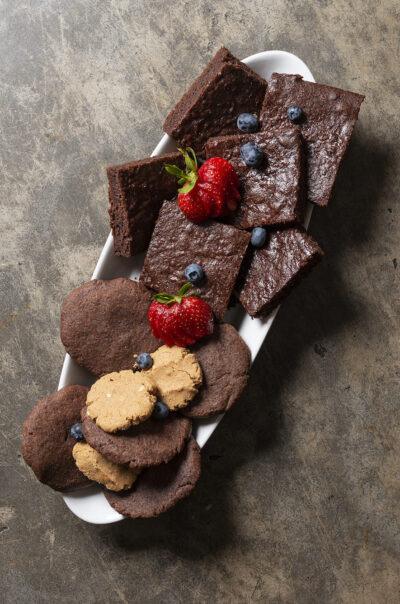
If you have a sweet tooth, The Plant-Based Foodie doesn’t disappoint. Recipes for Sprouts’ Famous Vegan Brownies were ridiculously easy and satisfying; I used oat milk in place of soy and 3 cups of sugar instead of the allocated 4. Call me sacrilegious, but I don’t subscribe to the notion that baking is sacrosanct chemistry. I think it’s something people say to simultaneously alienate others from attempting baking, and also because they also want the art of baking — perhaps considered too feminine to be worthy of merit, despite being arguably more crowd-pleasing — to be considered just as meritorious as the apparent loftiness of chef-y cooking. When it comes to both baking and cooking, I’m a little foolhardy; I experiment and adjust accordingly, i.e., rely on the powers of my observation. Sometimes it’s a disaster, but more often than not, I’m pretty pleased. In any case, I had incredibly moist, sweet brownies. If you have friends that erroneously assume vegan pastries are automatically inferior, don’t bother telling them until they’ve had some; they won’t notice.
Peanut Butter Chocolate Pillows — another recipe from Sprouts and Seedlings — are also easy and don’t require esoteric ingredients; if you ever wanted Reese’s Peanut Butter Cups in pleasing cookie form (which, of course you did); if you like desserts with different flavoured, complementary insides, these cookies (“pillows”) are for you.

Falafel Mango Salsa with Sprouted Quinoa from Café by Tao is the kind of recipe that makes you realize “sides” are an insultingly inconsequential name for lethally delicious components in the food equivalent of an orchestra, by which I mean: the dill cheese (nut-based, as are most vegan replicants of cheese, along with nutritional yeast) and the mango salsa (acidity, check. Sweetness, check. Everyone, it’s a perfect salsa) seriously amplify an otherwise merely good dish. The falafel by itself is on the drier side and lacks your traditional parsley; however, that’s exactly where the glorious dill cheese comes in, which is good enough to eat on its own or on a bagel.
On some of the recipes, there are helpful nuggets of information interspersed, e.g.
Extra virgin olive oil has a tendency to become very bitter when agitated in a blender or food processor. This is because extra virgin olive oil is very high in polyphenols which are really good for you but in the right circumstances taste horrible. Polyphenols are normally wrapped up in layers of fatty acids and therefore don’t mix into water-based foods . . . the rapid agitation of blending or processing can separate this protection and ruin your dressing, dip or hummus. Standard olive oil and most other cooking oils are not high in polyphenols so don’t have this problem (p. 38).
I’ve worked in the restaurant industry for five years and somehow remained in the dark a about that; if anything, EVOO (extra virgin olive oil) is considered de rigueur, i.e., the standard (how can something that’s extra be considered standard? Alas).
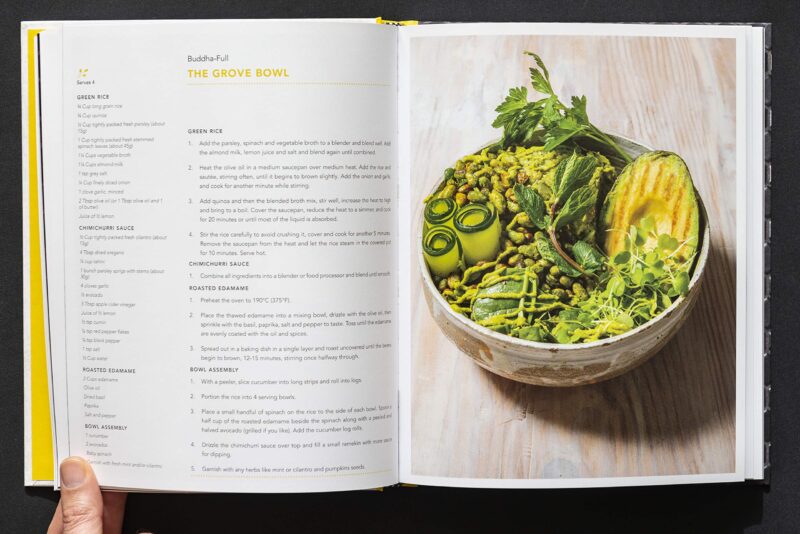
There are also fun historical tidbits, e.g.
Prior to 1915, they [avocados] also had two names, one that English speakers couldn’t pronounce, “aguacate,” and another that’s just plain unappetizing, “alligator pear.” In 1915, what was to become the California Avocado Association borrowed the Spanish word for the fruit, “avogado,” and tweaked it. Never mind that “avogado” also means “lawyer” which if more widely known at the time may well have become yet another liability. Additionally, given that the Spanish name comes from the native Nahuatl word for the fruit, “ahuacaste,” and this alludes to the male sex organ we could speculate that the Spanish name was an elaborate lawyer joke. In any case, the name stuck, but North America’s love of avocado didn’t become clear until the 1980s when a savvy marketing firm connected guacamole consumption to the Superbowl.
My first thoughts: there’s a California Avocado Association? (Of course there is). I already was greatly amused by “avocat” in French meaning lawyer; lawyers and avocados, are, to me, the same thing in French (whether avocados would be offended by a jurisprudential association, is not something I will explore here, but the answer is yes, probably).
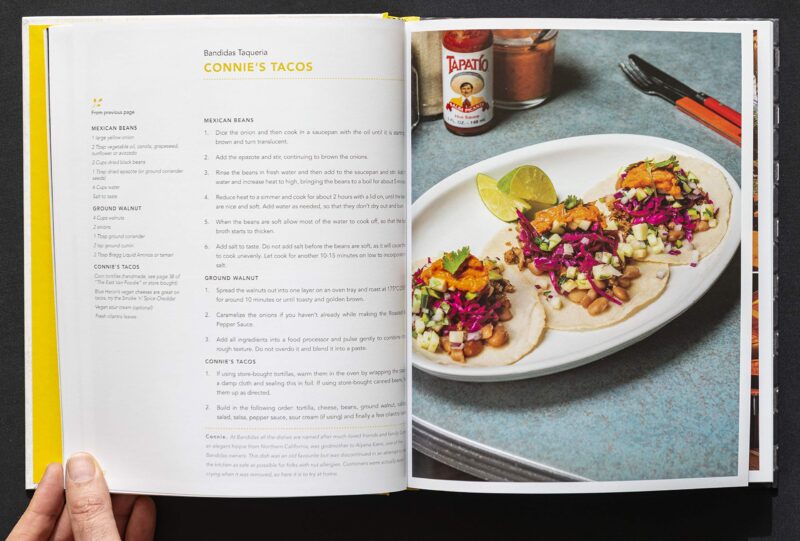

If you’ve ever been in the mood to devour something purple (which I will contend is not only a feeling but a distinct flavour, one I am hit with all too frequently, much to the exasperation of my collaborative cooking conspirator, e.g. “I want to eat purple”), Indigo Age Café’s Purple Sweet Potato Soup with Crisply Lotus Root Chips is an excellent choice. It’s also great paired with Beer Bread from Chickpea Restaurant. The soup gets its brilliantly anthocyanin-loaded colour from the starch-loaded combination of purple sweet potatoes (by the way, when procuring ingredients for this recipe, do not be fooled by the white Japanese sweet potato that is purple on the outside, but with white flesh. Make sure the purple sweet potato is purple inside and out) and purple potatoes. If you see a purple cauliflower, feel free to throw that in, too. The Beer Bread recipe is quite possibly one of the easiest bread recipes in the world, requiring no proofing and minimal effort, except perhaps to make sure you distinguish your abbreviations for your teaspoons and tablespoons before putting in the baking soda (let’s just say, I got sloppy and my first attempt at Beer Bread was like eating soap. Basically: read the directions twice, everyone). The bread rises more reliably than I do in the morning; it is perfect for dunking in the soup.

Hill — a publisher, editor, and photographer — has taken sigh-inducingly reverential, stunning photos that not only evoke deliciousness, but tell a story. Frequently, I found myself flipping through the book past midnight, feeling simultaneously tantalized and tormented (for whatever reason, I tend to look at cookbooks before going to bed, leaving me frustrated and ravenous, but also culinarily inspired). Dagenais’s write-ups on each of the restaurants generous enough to invite them into their kitchens are painful, beautiful reminders of how dining in restaurants in 2021 is fraught with ambivalence, to say the least.
The Plant-based Foodie is gorgeous, brimming with desirable, accessible recipes (and some aspirational ones), and an excellent testament to how far Vancouver has come towards elevating plant-based eating to its rightful throne. If you’re looking for a culinary diversion outside of pandemical sourdough starters and kombucha scobies, get this book; get in the kitchen.
*

Jessica Poon is a writer, line cook, and pianist in Vancouver. She recently completed her bachelor’s degree in English literature at the University of British Columbia. Visit her website here. Editor’s note: Jessica Poon has also reviewed books by Lindsay Wong, Emily St. John Mandel, Sheung-King, Eve Lazarus, Annabel Lyon, Monika Hibbs, Grant Hayter-Menzies, and Wayson Choy for The Ormsby Review.
*
The Ormsby Review. More Books. More Reviews. More Often.
Publisher and Editor: Richard Mackie
The Ormsby Review is a journal service for in-depth coverage of B.C. books and authors. The Advisory Board consists of Jean Barman, Robin Fisher, Cole Harris, Wade Davis, Hugh Johnston, Patricia Roy, David Stouck, Maria Tippett, and Graeme Wynn. Scholarly Patron: SFU Graduate Liberal Studies. Honorary Patron: Yosef Wosk. Provincial Government Patron since September 2018: Creative BC
“Only connect.” – E.M. Forster
